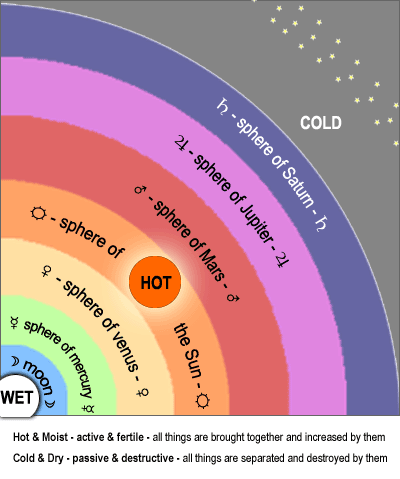
Ptolemy's Astrology (from Deborah Houlding, http://www.skyscript.co.uk/ptolemy.html)
Modern astrologers remember Ptolemy as the author of one of the oldest complete manuals of astrology, - the Tetrabiblos (Greek) or Quadrapartitium (Latin) meaning 'Four Books'. Although we know Ptolemy did not invent his methods of astrology we recognize his contribution as being one of orchestrating the mass of Eastern star lore into an organized and reasoned exposition. The Tetrabiblos offered a detailed explanation of the philosophical framework of astrology, enabling its practitioners to answer critics on scientific as well as religious grounds.
As a leading intellectual of his day, Ptolemy's patronage and approval of astrology
added to its academic respectability. By preserving its credibility as a science as well
as an art, he safeguarded its practice during the medieval period when many other occult
studies were persecuted on religious grounds. He spoke of astrology with authority and
lucidity, establishing the Tetrabiblos as the definitive reference for astrological
students. It was used extensively by Arabic scholars, who regarded Ptolemy as the final
word on the subject, and later by European ones when it was translated back into Latin in
the 12th century.
The Tetrabiblos has been referred to as 'the surrender of science' (1), an unfair
statement since Ptolemy reveals no interest in magic, superstition or ideas which fall
beyond the realm of reason. He adheres strictly to the current scientific views of his
era.
| Most of his philosophy rests upon the belief that planetary influences derive from the planets' relationship with the Sun (the source of heat and light) and the Earth (the source of moisture). In this way the Moon is regarded as a 'cool and moist' planet because it lacks the warmth of the Sun and lies in the proximity of the Earth. Saturn is 'cold and dry' because it is furthest from the warmth of the Sun and, again, from the moisture of the Earth. Planetary characteristics are defined by these humoural temperaments where, as in nature, warmth and moisture promote health and vitality whilst cold and dryness are conducive to decay. Hence Saturn becomes the principal agent of destruction and death; the 'Greater Malefic'. |  |
Through this hypothesis Ptolemy explains how the constant movement of the planets
creates an ever-changing atmosphere to which all the Earth's creatures are sensitive. Just
as two similar seeds grow differently as a result of their environment, so is each soul
affected by the celestial atmosphere at the time of its birth. In the principle of
sympathy and antipathy the aspects and movement of the stars continue to produce favorable
or injurious conditions -determined by the individual's personal disposition.
To Ptolemy, therefore, astrology is a scientific study because it operates according to
natural law. Although he maintains the importance of the angles of a chart, the
Tetrabiblos shows a noticeable lack of interest in the houses, whilst other elements of
astrology were considered to be completely unworthy of mention, either because they were
too unscientific, too reminiscent of fortune telling, or defied any kind of rational
explanation:
"... as for the nonsense on which many waste their labor and of which not even a
plausible account can be given, this we shall dismiss in favor of the primary natural
causes. What, however, admits of prediction we shall investigate, not by means of lots and
numbers of which no reasonable explanation can be given, but merely through the science of
the aspects of the stars to the places with which they have familiarity." (2)
Notes & References: